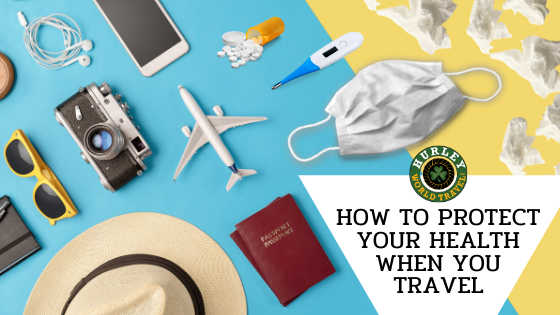Every year an increasing number of Americans are traveling internationally for vacations, business, visiting family, and volunteering. To ensure you are prepared and protecting your health when you travel, follow these 18 recommendations. Many are common sense that should be used every day, but we forget due to the busyness of our daily lives. Bonus! See the Pack Smart – Pack for a Healthy Trip checklist from The Centers for Disease Control at the end of this article.
- Work with Your Travel Agent – Working with your travel agent to plan your vacations helps you reduce and avoid health problems during your trip. Your travel agent can help you select the best locations, modes of transportation, and physical activities that match your goals, physical ability, and health. Your travel agent will also make recommendations about whether or not a destination is safe and healthy for you.
- Know Your Destination – Learn about your destination, how medical care is handled there, and what illnesses to watch out for there. Be sure to bring appropriate insect repellent/protection and clothing to protect you from the types of insects you may encounter there.
- Avoid Destinations Known for Illness – If the Centers for Disease Control or World Health Organization or other national travel organizations recommend avoiding certain destinations or modes of travel in countries due to health hazards, follow their recommendations and avoid traveling near those locations.
- Check Your Medical Coverage – Check with your medical insurance provider regarding your medical insurance coverage in countries other than the US. If your medical insurance coverage is limited, check with your travel agent about purchasing appropriate travel insurance that will cover you while you’re away.
- Visit Your Doctor Before You Go – Get checked by your physician before you travel to ensure you have no health issues while you’re away. Follow your physician’s recommendations if he/she recommends that you not travel at this time due to health concerns.
- Are You Healthy to Travel? Have you been ill recently? Have you had recent surgeries? Be sure you have fully recuperated before you travel to avoid relapses or recuperation issues while you’re away.
- Get Healthy Before You Go – Be sure to get plenty of rest, eat healthy foods, drink plenty of fluids, and stay away from family, friends and business associates who are sick prior to your travel. Exercising and increasing your walking prior to travel will improve your muscle tone, and increase your stamina and physical duration. Travel can be very strenuous, especially if you’re typically not an active person. Preparing your health prior to travel will help ensure you avoid problems and enjoy your trip.
- Get Your Vaccinations – Are your vaccinations up to date? Are any other vaccinations required before you travel to your destination? Have you had a flu shot? A pneumonia shot? Check with your doctor before you travel to ensure you are current on all vaccinations required to protect your health on your trip and at your destination.
- Pack the Right Medications – Ensure you have all the appropriate prescription and over-the-counter medications you will need during your travels. Bring a list of your prescriptions and name and phone number of the pharmacy in the event you need to replace your medications.
- Pack a Medical Kit – Pack a medical kit including Band-Aids, antiseptic cream, and other items you may need during your trip.
- Stay Hydrated When You Travel – The cabin air on airlines today is much drier than our typical home and work air quality. It’s important to have a large bottle of purified water with you on your flight so that you stay hydrated. Bottled water may be purchased at the airport after you pass through security. Also, you may bring an empty water bottle with you that may be filled with purified water after you pass through the security check point.
- Disinfect Your Seat, Armrests, Tray Table, Airplane Bulkhead, and Bathroom – Bring antibacterial wipes that also kill viruses with you and wipe off all surfaces you will touch in your seating area. Do this on every flight you take to kill the germs other passengers leave behind. Wipe off bathroom door handle, faucet, and flush handle before you use the bathroom on your plane. With the quick flight turnaround times airlines must maintain, their crews don’t have time to disinfect these surfaces, so you should make this a routine of your air travel.
- Disinfect Your Hotel Room – Using antibacterial wipes, while off all surfaces, handles, light switches, door knobs, telephones, and TV remotes in your hotel room.
- Wash Your Hands, Avoid Touching Your Face – This tip goes for anytime, really, not just when you travel. It’s always a good practice to wash your hands frequently when you’re traveling or in any public place. Avoid touching your face with your hands unless your hands have been thoroughly washed to avoid infection.
- Stay Away from Sick People – If you think someone is sick near you when you travel, do your best to stay away from them.
- Bring Health Documentation With You – Be sure to keep a list of allergies, medications, health issues, and the names of your travel companion with you and keep them with you at all times. Also, add the name and contact information of the person to be notified should you become ill.
- Check Out Health Facilities When You Check In to Your Hotel – Something most of us rarely do, but when you check into your hotel, ask them where the nearest hospital is located and what the hotel does if you need a doctor or medical attention.
- Watch Your Health When You Get Home – Pay attention to your health when you return from travel. If you become ill, let your doctor know where you traveled so that he/she can be looking for other medical issues that may be indicative of the location you just visited.
PACK SMART – PACK FOR A HEALTHY TRIP
Use this checklist to prepare for your next trip abroad. Make sure to bring items with you, since quality of items bought overseas cannot be guaranteed. Not all of these items may be relevant to you and your travel plans. (Source: The Centers for Disease Control)
Prescription Medicines
- Your prescriptions
- Travelers’ diarrhea antibiotic
- Medicines to prevent malaria
Medical Supplies
- Glasses and contacts
- Medical alert bracelet or necklace
- Diabetes testing supplies
- Insulin
- Inhalers
- EpiPens
Over-the-counter Medicines
- Diarrhea medicine (Imodium or Pepto-Bismol)
- Antacid
- Antihistamine
- Motion sickness medicine
- Cough drops, cough suppressant, or expectorant
- Decongestant
- Pain and fever medicine (acetaminophen, aspirin, or ibuprofen)
- Mild laxative
- Mild sedative or sleep aid
Supplies to Prevent Illness or Injury
- Hand sanitizer (containing at least 60% alcohol) or antibacterial hand wipes
- Water purification tablets
- Insect repellent (with an active ingredient like DEET or picaridin)
- Sunscreen (with UVA and UVB protection, SPF 15 or higher)
- Sunglasses and hat
- Condoms
- Earplugs
First-aid Kit
- 1% hydrocortisone cream
- Antibacterial or antifungal ointments
- Digital thermometer
- Oral rehydration salts
- Antiseptic wound cleaner
- Aloe gel for sunburns
- Insect bite anti-itch gel or cream
- Bandages
- Disposable gloves
- Cotton swabs (Q-Tips)
- Tweezers
- Eye drops







We are the most dedicated and caring Medical Escort Service in the United States and across
the world. If you need the best quality Medical Escort or Medical Repatriation services in the world you are in the right place.
Click here: https://www.rnmedflights.com
[…] clindamicina con peroxido de benzoilo[…]
clindamicina con peroxido de benzoilo